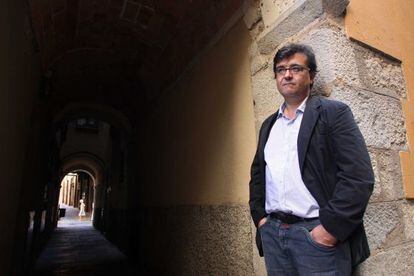“Juvenile crime is the black hole of the Transition; heroin was our war”
After dissecting the 1981 coup in his previous work, Javier Cercas’ latest novel seeks out a story that made few headlines


The reader is tempted to ask for mercy. The pages keep turning but there is no certainty, everything remains ambiguous and unsettling, both in terms of the story and of the characters. Las leyes de la frontera (or, Border laws) is the sixth novel by Javier Cercas and marks his return to "pure fiction, the joy of fiction" after his previous award-winning work, The Anatomy of a Moment, which probes the events surrounding the coup attempt of February 23, 1981.
It is curious to note that Las leyes de la frontera is a literary artifact with a nearly perfect mechanism that serves to portray the imperfection of life. By comparison, the plot seems almost unimportant: in the post-Franco summer of 1978, a teenage charnego (a pejorative term for a southern Spaniard who moves to Catalonia) happens to meet two juvenile delinquents. Together they take a walk on the wild side of the Spanish transition to democracy, the one associated with stick-ups and heroin.
Again, this represents a leap into the unknown for Cercas following his exploration of the Civil War in Soldiers of Salamis and of the backroom politics behind the failed 1981 coup. "It's not a premeditated thing for me to change the script of the literary or social agenda; I act out of obsession and one of my obsessions is to review all the great myths of our society."
Like all of Cercas' work, there is an all-absorbing question at the heart of his new novel, and the question arose in his mind when he saw an exhibition called Quinquis de los 80 (or, Small-time crooks of the 1980s) in Barcelona. "There was a set of portraits of young people who died due to violence, heroin or AIDS. I almost started crying because I asked myself: 'Why them and not me?'"
All those who died due to violence or drugs -- why them and not me?"
Cercas, who is the son of immigrants from Cáceres, used to live in the suburbs of the Catalan city of Girona. One day, someone in his handball team made him cross the River Ter to see what was on the other side. "It was a different world, with wooden barracks where thousands of people huddled in complete misery," he recalls. This was the genesis for the novel.
The history books that cover the Transition tend to gloss over the juvenile crime that marked this period and which ultimately produced a subculture of its own (in movies like Perros callejeros, released as Street Warriors in English, or music by Los Chunguitos and Los Chichos...). And that's when it is not ignored altogether.
"Juvenile crime is the great black hole of the Transition: I've done research on it and it's unbelievable. There are no real figures on how many people succumbed to heroin, which was the war of our generation," says the 50-year-old writer, who has also been a columnist for EL PAÍS since 1997. "The odd book talks about an 'involuntary holocaust.' You could already see the results of the baby boom, with a brutal amount of young people without a job, alienated from society, ignoring the legal obligation to go to school... Heroin fell on top of this social powder keg and destroyed everything, like a bomb. Later, conspiracy theories saw a state strategy to introduce the drug in order to avoid social revolts, but no."
Cercas theorized on all this in a series of pre-novel essays that will not be seeing the light, at least not for now. "In order to write one book, I need to complete two. It happened with Soldiers of Salamis; I threw a previous novel into the trash bin. With Anatomía I first got rid of a very novel-like text... A burden? No, it's my chief virtue: when I think I have written the same book I have already written, I leave it at that; it's the minimum ethic a writer must have."
Any great novel must have a blind spot; what is Joseph K. accused of?"
And that is why he says that "writing is rewriting" and why his stories flow naturally on the basis of believable dialogues and a stylistic complexity that does not appear to be so. In fact, he makes a point of it: "I try and make it so that readers don't notice that they are reading literature; I almost look for an anti-style. When I notice that a sentence sounds too literary, I chop it right out... The text has to ring true, true in a literary way, but true nevertheless."
This technique, which is pure Cercas, is placed at the service of ambiguity. The author calls it "a novel's blind spot" and figures that all important books must have it. "Moby Dick has an enormous blind spot: is the whale good or evil? What is Joseph K. accused of in The Trial? What is Kafka's castle? Is Don Quixote a ridiculous being or a role model? Not seeing is what allows you to see; not saying things is what really speaks volumes; reality is not one, but dual, and irony is the instrument of knowledge. Any great novel must have a blind spot."
Ultimately, Las leyes de la frontera talks about poverty, about the poor who were unable to cross the border, and who perhaps always knew they wouldn't. Determinism permeates the story.
"There are people who are always outside of history," he says in a serious tone. In any event, it is a 1970s issue that could easily become a contemporary issue again due to the economic crisis. "These borders have always existed, but the years of bonanza and the subsequent optimism made us forget them and we behaved as though they no longer existed, but there they are, and they follow the laws that regulate the passage from one side of the river to the other. That is why it is always good to remember where we came from."
Cercas says he wrote this novel "with great ease of mind and less pressure than ever," a far cry from the pressure he felt when he was writing The Speed of Light, his first novel following the international success of Soldiers of Salamis. "The Speed of Light was the hardest book to write for me [...]. It used to be the case that half the books I've written, only my mother actually read."










































